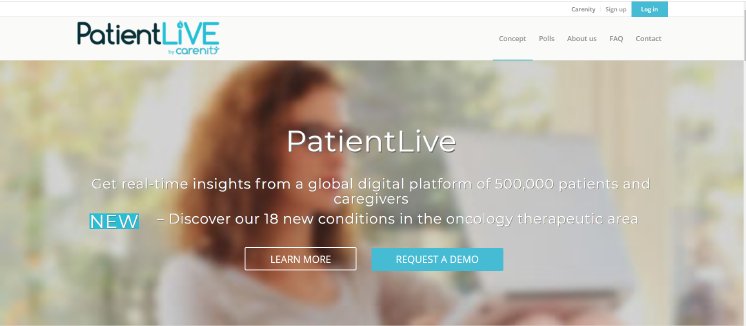PatientLive was created by Carenity in 2016 with the purpose of offering pharma companies a unique, compliant, and fast way to get access to real-time patient insights. The Carenity team believes that guesswork is no longer enough, but knows that time is also valuable. This is why Patient Live allows users to get quick answers from patients to make better decisions.
Carenity's mission is to help improve medical knowledge and care for chronic patients, including patients with cancer, which is the driving force behind the opening of 18 new PatientLive conditions. These conditions, both in hematology and solid tumors, are: bladder cancer, breast cancer, colorectal cancer, esophageal cancer, Hodgkin lymphoma, non-Hodgkin lymphoma, liver cancer, lung cancer, mouth cancer, multiple myeloma, ovarian cancer, pancreatic cancer, prostate cancer, renal cancer, skin cancer, throat cancer, thyroid cancer, and tongue cancer.
Until today, PatientLive offered access to a worldwide online panel of 500,000 patients and caregivers in the following conditions: ankylosing spondylitis, arterial hypertension, asthma, bipolar disorder, COPD, Crohn’s disease, depression, Diabetes (Types 1 and 2), epilepsy, fibromyalgia, lupus, multiple sclerosis, NASH, obesity, osteoarthritis, psoriasis, and rheumatoid arthritis.
Michael Chekroun, Chief Strategy and Transformation Officer at EvidentIQ group and Founder of Carenity, tell us about this new offering:
“PatientLive has always offered quick responses and has been valued for its simplicity and autonomy of use. We want now to make this available for pharma companies focused on oncology and keep this virtuous circle of Data for Good going.”
More about PatientLive
PatientLive is a SaaS platform that allows users to acquire real-time insights through a five-question survey. Five types of questions are available: single choice, multiple choice, 0 to 5 scale, text field, numeric field, and image/video test. Users can access results in real-time, from day 1. Surveys on PatientLive initiate patients’ data generation on topics including: disease/treatment burden, unmet needs, quality of life, services and communication message testing, and information and service needs. These early insights are invaluable for PatientLive users as they enable better patient-centric solutions and materials, and may guide the development of further non-observational studies and Real World Evidence projects.

